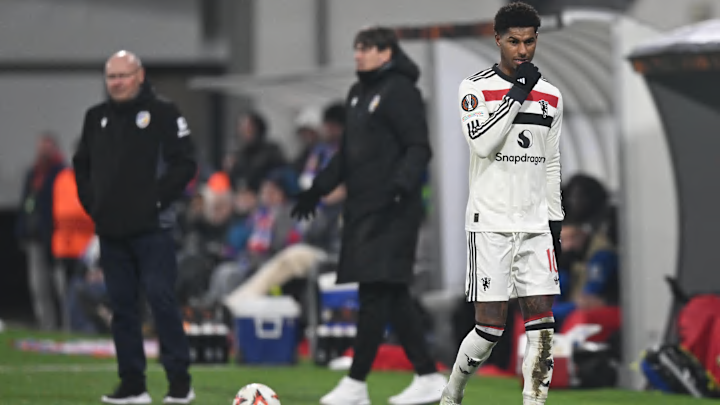The winds of change are blowing through Old Trafford, as Marcus Rashford's tenure at Manchester United faces unprecedented scrutiny under the club's new ownership. Sir Jim Ratcliffe, the new decision-maker in football operations, is wasting no time reshaping the Red Devils. As Ruben Amorim takes the reins, Rashford's potential departure symbolizes a seismic shift in strategy aimed at rebuilding a faltering squad. This move underscores Ratcliffe's bold "club-first" approach, where no player, no matter how iconic, is beyond scrutiny.
Speaking after Rashford's exclusion from the matchday squad during United's 2-1 derby victory over Manchester City, Amorim explained:
"It's not just about talent. It's about performance in training, how you dress, how you eat, and how you push your teammates."
With the 27-year-old forward reportedly ready for a new challenge, as he revealed in an interview with BBC Sport, the stage appears set for a decisive and symbolic departure.
Marcus Rashford: A Star Dimmed by Inconsistencies

Few players have encapsulated the highs and lows of Manchester United's post-Ferguson years quite like Marcus Rashford. His early promise as a homegrown prodigy made him the face of United's academy success story, but his trajectory has faltered in recent seasons. Rashford's 2022-23 campaign, where he notched a career-high 30 goals, now feels like an anomaly in a sea of inconsistent displays. This season, the forward has managed just seven goals in 24 appearances, raising questions about his form and focus.
Off the pitch, Rashford's lifestyle has come under scrutiny. Reports of late arrivals to training, international breaks spent attending NBA games, and nightclub visits have drawn criticism from fans and pundits alike.
Gary Neville recently remarked that Rashford's actions reflect a player "out of sync" with the discipline and professionalism required at the elite level. These issues and his hefty £365,000-a-week wage make him a prime candidate for a high-profile exit.
Ruben Amorim's Tactical Vision

The arrival of Ruben Amorim at Old Trafford signals a profound tactical shift. Known for his modern, high-intensity style of play, Amorim prioritizes cohesion, work ethic, and versatility in his squad. His preferred system relies heavily on inside forwards—players who can drift centrally, link play, and contribute defensively—making Rashford's role as an inverted winger increasingly redundant.
While Rashford's explosive pace and ability to cut inside from the left flank have been his trademarks, they do not align with Amorim's emphasis on tactical fluidity. The Portuguese manager favors attackers who press aggressively, create in tight spaces, and support midfield transitions. Pedro Gonçalves, a star under Amorim at Sporting CP, exemplifies the qualities United's new head coach seeks—qualities Rashford has struggled to display consistently.
The Case for Selling Rashford is A Cultural Reset Under Sir Jim Ratcliffe
At 27, Rashford finds himself at a critical juncture in his career. His current market value presents Manchester United with a rare opportunity to recoup a substantial transfer fee while reinvesting in younger, more adaptable talent. Paris Saint-Germain and several Saudi Pro League clubs have been linked with the forward, offering potential destinations to accommodate his salary and stature.
From a business perspective, selling Rashford now is a pragmatic move. His age and the club's inability to extract consistent performances make this the ideal time for a transfer. The funds generated could be redirected toward players better suited to Amorim's tactical vision, accelerating United's rebuild.
Rashford's potential departure represents more than a tactical adjustment; it marks a cultural turning point under Sir Jim Ratcliffe's ownership. Ratcliffe has been vocal about his ambition to transform Manchester United into a disciplined, modern, and competitive force. His no-compromise approach to player standards is a stark departure from the complacency of the Glazer era.
"Messy and painful decisions are necessary to fix what's broken," a United insider told The Guardian. Rashford's exit would signal the end of an era where sentimentality often overshadowed practicality, paving the way for a more ruthless and results-oriented culture.
A Bold Statement of Intent
Unsurprisingly, the prospect of Rashford's exit has polarized Manchester United's fanbase. For many, the Wythenshawe-born forward is more than just a player—it symbolizes the club's identity and a connection to its rich history. Others argue that his performances have not justified his status as one of the team's highest earners and that his departure could reinvigorate a stagnant squad.
Social media has become a battleground for these opposing views. "We need players who fit Amorim's system, not nostalgia," one fan tweeted, while another countered: "Selling Rashford would be the ultimate betrayal of United's traditions."
Moving on from Marcus Rashford would send a powerful message about Manchester United's priorities under its new leadership. It would demonstrate a willingness to make tough decisions to pursue long-term success, reinforcing the idea that no player is bigger than the club.
This approach aligns with broader trends in modern football, where elite clubs like Liverpool and Bayern Munich have thrived by adhering to disciplined transfer strategies. By shedding underperforming stars and investing in younger, more versatile players, United could lay the foundation for sustained success.
What Lies Ahead
As Rashford contemplates his next move, Manchester United must navigate the complexities of a high-profile transfer while staying true to their rebuilding strategy. Whether this marks the beginning of a brighter era or another chapter of upheaval remains to be seen. What is certain, however, is that the club is determined to chart a new course—one defined by discipline, vision, and an unwavering commitment to excellence.
For Rashford, a fresh start could reignite his career and allow him to fulfill his untapped potential. For United, his departure could be the catalyst for a long-overdue transformation. As the club prepares to turn the page, fans and pundits alike are left with a lingering question: Is this the end of an era or the start of something greater?
